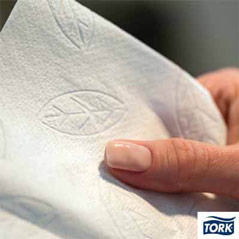
Lately, there has been talk about the importance of hand hygiene. For years the scientific community has been dealing with the issue of hand hygiene and their cleanliness has been the subject of studies and research.
However, when we hear "hand hygiene" our mind goes mainly to the process of washing them. Here we come to add and highlight an often overlooked process: hand drying. As important as hand washing is, so is their drying, since one process complements the other and is inextricably linked.
But what is the appropriate way to dry your hands?
The above question has been the subject of much research [1], the results of which show that:
- The air appliances, as the wet hands dry, disperse bacteria, viruses and other harmful microorganisms into the space. Thus, there is a risk for the people standing in front of them to come in contact with them, inhale them or settle on their clothes. In a study of 2015[2] Hot air appliances were found to disperse 1300 times more bacteria than paper towels.
- In a study published in Journal of Hospital Infection[3], It is reported that the total bacterial levels in the hot air appliances were up to 30 times higher compared to the bacteria that may be present in the hand towel appliances..
- Hand dryers, in addition to dispersion, can facilitate the growth of germs because they provide a warm and humid environment, ideal for their incubation.
- Study of Westminster University[4] concluded that disposable wipes not only promote the least spread of germs, but also effectively remove the remaining bacteria left on the hands after washing.
- The paper towel not only dries the hands more efficiently, but also faster. Specifically a hand towel dries the hands by 96% in 10 seconds while air appliances need 45 seconds to achieve similar results (97%).
- Another interesting and practical aspect of air appliances is that they allow only one user at a time to use them and this person may even need a minute to dry his hands. So many to avoid waiting choose to dry their hands a little to not at all.
- Air appliances can be quite noisy. The volume levels even reach 90 decibels. This sound is just as loud as that of a lawn mower.
- Hand towels can be used multiple times after hand washing to close the tap or open the door.
Συμπερασματικά
The results of the relevant studies show that from the point of view of hygiene, the drying of the hands with a disposable paper towel is superior to the drying of the hands with air.Strong objections and concerns regarding the excessive use of paper have been expressed for environmental reasons. In this, the stationery industry comes to respond with disposable paper companies να use innovative strategies to ensure that their products are produced with environmentally friendly practices, such as τthe maintenance of forestry, τονreduction of CO2 emissions and τη use of appropriate recycling measures. In fact, more and more paper products are soluble and biodegradable. Hand towels can be a viable and environmentally friendly option for hand drying. Towels are now set up to provide guests with enough paper to dry their hands completely each time.
No matter where it comes from, hospitals, restaurants, retail stores, schools or other high-traffic facilities, hand towels are a critical factor in good hand hygiene.
Consumers themselves clearly show their preference. It is no coincidence that 75% of people prefer paper towels to hot air dryers. Providing towels in shared toilets, their guests are given the ideal and desired method of drying hands, while ensuring the environment is cleaner, safer and healthier.
[1] Mayo clinic, The Hygienic Efficacy of Different Hand-Drying Methods: A Review of the Evidence https://www.mayoclinicproceedings.org/article/S0025-6196(12)00393-X/abstract
[2] Society for applied microbiology, https://sfamjournals.onlinelibrary.wiley.com/doi/full/10.1111/jam.13014
[3] The journal of hospital infection, https://www.journalofhospitalinfection.com/article/S0195-6701(18)30366-9/abstract
[4] https://europeantissue.com/hygiene/studies/uow/




